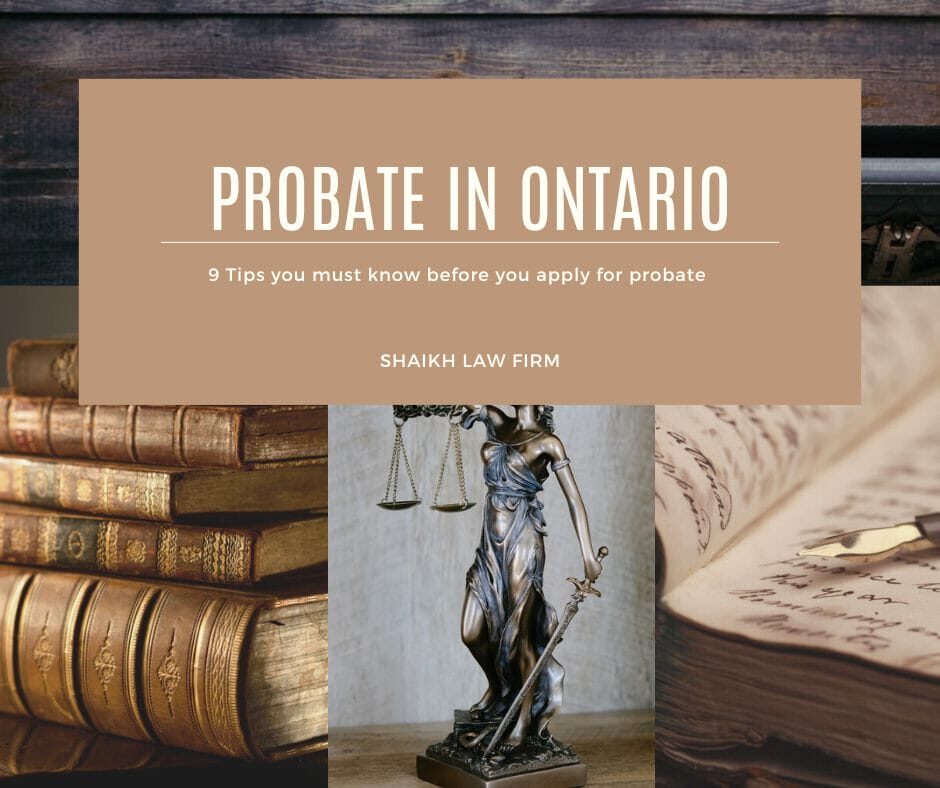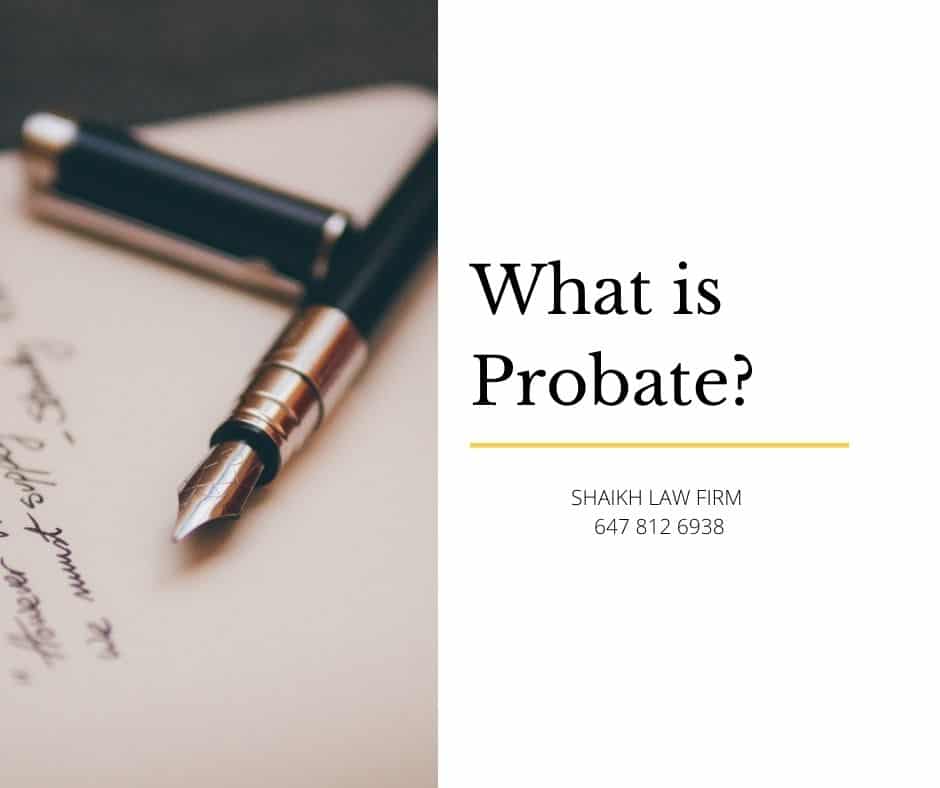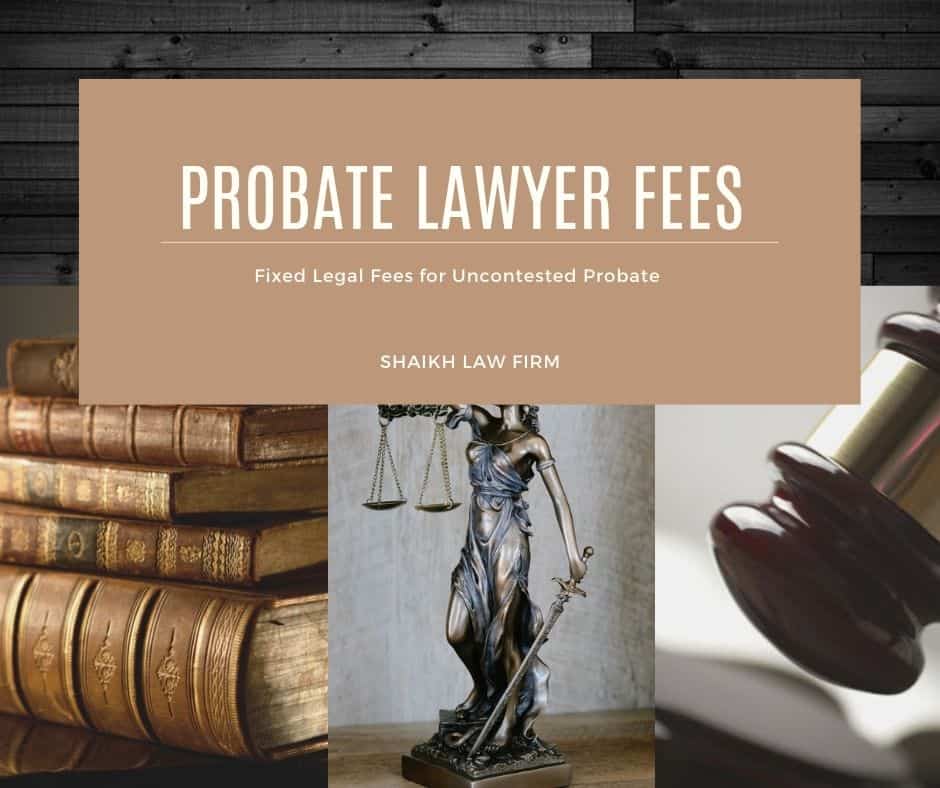Understanding Probate in Ontario is essential for fulfilling legal obligations and ensuring a smooth transition of the deceased’s assets to their rightful heirs. When a loved one passes away, managing their estate can be a daunting task, especially under the weight of grief.
In Ontario, the probate process is a critical step for many executors, involving the official recognition of a will and the formal appointment of an executor.
This guide provides 9 Practical Tips for navigating it efficiently. Additionally, useful resources and links throughout the content will assist you in understanding everything you need to know about probate in Ontario.

Probate is a legal process where the court formally validates the deceased’s Last Will and confirms the executor’s authority as the estate trustee to distribute the deceased’s assets, such as real estate, bank accounts, and financial investments. If there is no Will, then by way of probate, the court appoints an estate trustee to distribute the deceased’s assets to the beneficiaries or legal heirs.
Upon completing the probate process in Ontario, a Certificate of Appointment of Estate Trustee is issued. Supreme Court of Canada defined the purpose of probate in the case of Re Eurig Estate [1998] S.C.J. No. 72
” The purpose of probate is to certify that a will and codicils have been duly proved and registered in the court and that the administration of the property of the deceased has been committed by the court to the person named in the will as executor.”

Probate is required to distribute deceased assets to the rightful legal heirs, and if there is a Will, then to validate a deceased person’s Will while ensuring all debts and taxes are settled.
The probate in Ontario involves several steps, including:
Overall, probate in Ontario is necessary to ensure that a deceased person’s wishes are followed and their assets are distributed according to their will. While the process may seem complex, working with a probate lawyer in Ontario can help ensure that it is completed efficiently and effectively.

Probate is not required for every estate in Ontario. Estates with joint or minor assets, such as a vehicle worth less than $5,000, often do not need to go through the probate process. Therefore, probate in Ontario is not mandatory. However, some financial institutions may request probate in Ontario before releasing assets.
However, the necessity for probate can vary based on the asset types and their values. Significant assets like real estate or substantial bank accounts usually require probate to confirm the executor’s authority to manage and distribute the estate.
Please see our complete guide for a detailed discussion of when probate is required and how to navigate the process.
When preparing to file a probate application in Ontario, it’s important to gather all the required documents to ensure a smooth process. Here is a checklist of the key documents you will need:
Additional Considerations
Note: Applicants often encounter complexities during the process of filing probate in Ontario. Consulting with a probate lawyer can help avoid mistakes and ensure that all paperwork is filed correctly.
Probate in Ontario requires applicants to pay Estate administration tax, commonly referred to as EAT or probate Tax. EAT is a fee charged by the Province of Ontario on the estate of a deceased person. This tax is calculated based on the fair market value of all the estate’s assets at the time of the individual’s death. Accurately appraising and documenting asset values early in the probate process is crucial for determining the tax owed effectively.
Probate Tax or EAT is calculated:
To ensure accuracy, all valuations should be supported by appropriate documentation, such as account statements or appraisals from qualified professionals.
Probate Tax Calculator.
Please enter a valid amount.
You may be able to withdraw funds from the deceased account to pay immediate expenses such as funeral bills, utility bills, property tax, probate tax, probate lawyer fees, and other direct costs.
Once you have obtained a copy of the death certificate, you should arrange for a meeting with your branch manager.
All financial institutions are very cooperative with the family members of the deceased.
Your bank would require a copy of an invoice to prepare in the deceased’s name before issuing a bank draft. Therefore, all invoices should be in the deceased’s name with the executor’s care. Example: Deceased C/o Executor
Once you have made a list of all assets, calculated their value for estate administration tax, gathered and completed all relevant documents. You want to make sure you file your documents with the correct courthouse.
All probate applications in Ontario must be filed before the Superior Court of Justice. Therefore, you need to file your application with the correct Superior Court of Justice in Ontario. Ideally, a probate in Ontario is filed at the court where the deceased lived at the time of death. However, if the deceased was not living in Ontario but had property in Ontario, then the court where the property is located.

Effective January 1, 2020, you must file an Estate Information Return within 180 calendar days after the Certificate of Appointment of Estate Trustee has been issued. Contact your probate lawyer to help you file the Return. You can download the Return by clicking here.
You do not need to file an Estate Information Return if you are a Succeeding Estate Trustee with or without a Will or during litigation.
In addition to the Estate Information Return, the representative is also expected to file an Income tax return for the deceased under the provisions of the Income Tax Act. It is strongly recommended that the tax return be filed to avoid any late penalties by the Canada Revenue Agency. Contact your accountant to help you file the deceased’s income tax.
Hiring a professional executor can be a wise decision if the estate is particularly complex or if there are potential conflicts among beneficiaries.
Professional executors, such as trust companies or legal professionals, bring expertise and impartiality to the administration of an estate. They can manage everything from paperwork and court filings to the distribution of assets and settling of debts, ensuring that everything is handled according to the laws of Ontario.
Professional executors are especially valuable in situations where:
Hiring a professional executor for probate in Ontario can help you ensure that all aspects of the estate are managed professionally and efficiently, providing peace of mind to all parties involved and helping prevent potential conflicts or legal issues down the road.
Probate in Ontario Costs range from $1500 to $2500 + HST in legal fees, plus applicable Estate Administration Tax, calculated at $0 for every asset up to $50,000 and $15 for every $1,000 of assets over $50,000.
Note: Probate fees are paid from the assets of the deceased’s estate, not by the personal representatives, executors, or beneficiaries. The executor of the estate typically uses assets from the estate, such as bank accounts, to cover these costs.

No! You are not legally required to hire a probate lawyer to file a probate application in Ontario or to manage an estate. However securing expert legal counsel is crucial for ensuring the process goes smoothly. At Shaikh Law Firm, we believe that having a dedicated Probate Lawyer on your side can significantly benefit the administration of the estate for several reasons:
Choosing to work with a probate lawyer at Shaikh Law Firm means ensuring that your loved one’s legacy is honored and that the probate process is handled with the utmost care and respect.

At our Law Firm we beleive in giving our client’s an oppourtunity to learn more about our expertise and experience before deciding to retain us. We offer 15 minutes free legal advice in Ontario. Call us, email us or use the form below to book your Free consultation with a lawyer.
If you are based out of Ontario, please email us to book your appointment.
(905) 795 7757
info@slclawyer.ca
(905) 795 1271
How Much Does An Estate Have To Be Worth To Go To Probate?
In Ontario, the necessity for probate depends more on the type of assets and institutional requirements than on a specific estate value. While there is no fixed monetary threshold, smaller estates with simple assets may bypass probate if financial institutions agree. Typically, estates valued under a certain amount, such as $5,000, might not require a probate certificate, depending on the institution’s policies. Learn More
Remember, our initial 15-minute consultations are always free, and we’re here to answer any additional questions you might have. Contact us today to get started.